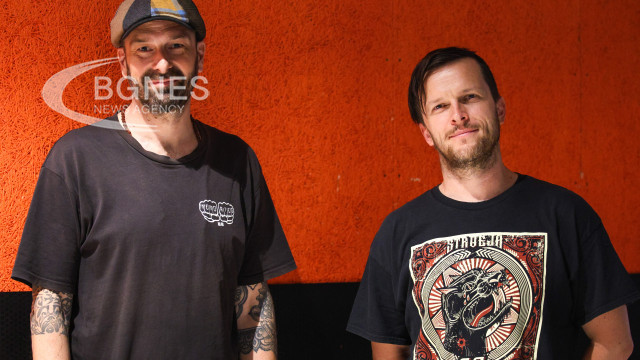Someday, Sarajevo will be like Sofia, musician Brano Jakupovic from the most popular Bosnian rock band DUBIOZA KOLEKTIV told BGNES. For years, punks have been spreading the authentic Balkan spirit, successfully mixed with ska, reggae, dance and brandy throughout the Balkans and Europe.
BGNES met Brano and Vedran Mujagic, who were in the capital "Stroezh" on Friday for their special audio-visual show - DISKOBAJAGI.
"We recognize this place as another hometown, another home. So it's only natural that we come back. It was love at first sight," shared Vedran and Brano.
"We like the culture, it is very similar to our homeland (Bosnia and Herzegovina). The way people react to our music. And usually people during concerts are very expressive, which we like. So we just recognize this place as another hometown, another home," Brano shared. Vedran added the feeling of "love at first sight" and shared his feelings during their first concert in Bulgaria.
"We didn't know what to expect. And then many people came. Many of them already knew the songs. We were very surprised. We were like "what's going on"? It was love at first sight and it literally lasted over the years.”
According to Brano, Sofia is like an older brother of Sarajevo, and in the future his hometown may look a lot like the Bulgarian capital.
"For me personally, I like the most that Sofia is like Sarajevo, but twice as big. This is very interesting to me. I can explore Sofia as the future of my own city. I think that Sarajevo will be like Sofia when more than one million people live in it. It's weird because you go to a foreign place and everything sounds and looks so familiar," the musician said.
There will be new music for the big summer concert in Sozopol
DUBIOZA KOLEKTIV will have a big concert in Sozopol this summer, and at the beginning of May the artists hinted that fans are in for a lot of new music.
"We are returning to the coast after many years. There will be new material and we will try to make it interesting for the fans, especially those who missed our last concert in Sofia", said the performers.
Brano Jakubovic and Vedran Mujagic are part of the people who created the group in 2003. In most of their pieces, they criticize the nationalism that broke out during the war in Yugoslavia. The performers know well the consequences of nationalism that their country experienced in the form of massacres by Serbian forces during the war.
People still fear war and conflict because of the traumas of the 1990s
For Brano and Vedran, the current rhetoric of Republika Srpska politicians (as well as extreme politicians in the region in general) is entirely aimed at scaring people in order to keep their positions as "leaders".
"This is the pattern that keeps repeating itself. When the economic situation is bad, when they don't have solutions to the real problems, then they go to this kind of rhetoric and talk about war," Vedran said.
"They know it works because people are still afraid of war and conflict because of the traumas of the 1990s and they use it. They say once "we will fight". And the next day they immediately turn the pancake over because they don't have the means to do it," he added.
Brano, for his part, said it's easy to be that kind of nationalist politician because you just have to find an enemy and build on it from there. You don't even have to do anything, just scare people with it.
According to the two musicians, there is currently no real danger of conflict because the situation is different, there are not as many weapons and the tension is not at the same heights as in the 90s.
"There may be some small conflict. A conflict that you have in the football stadium can be moved to, I don't know, a village or something. But a serious conflict. A serious big conflict. I don't think so", commented the dvamara.
Eurovision is like a ridiculous European Parliament
With the Eurovision final this weekend, Vedran and Brano likened the music competition to a very funny European Parliament, but in a musical way.
"We're using this contest as a metaphor for how Europe works," they said, referring to their history with the contest, when Dubiosa potentially became BiH's representative at Eurovision, but was kicked out of the contest because it was too "political."
"The idea was just to write a song and then send six very good-looking young men to come on stage naked and with big erections," Brano details the story.
"And they would have, they would each have a gold or yellow star with a hole in the 'middle'. They should do a dance or something to our song. And then at the end you would see as a frame 12 stars spinning around.”
"And then at the end, the big crescendo is going to be when they just put the stars in, and it's just going to be genitalia. They didn't say the song can't because it has penises in it, but because it's political," he concluded, adding that the competition is ridiculous because they allow Toto Coutugno to sing about a united Europe, but consider "naked stars" political theme. /BGNES







